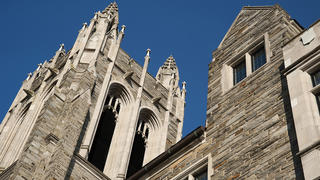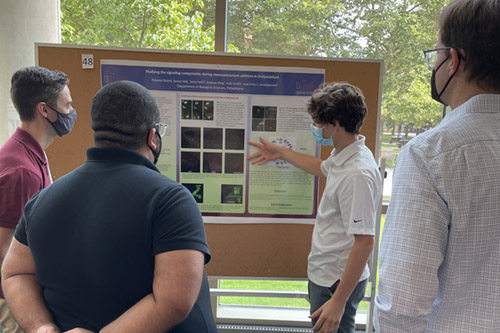High School Student gets Experience Researching Cell Movement in Biological Sciences Lab

Editor's note: This article was written prior to University of the Sciences' merger with and into Saint Joseph's University and does not reflect the current, combined institution. References to programs, offices, colleges, employees, etc., may be historical information.
USciences’ emphasis on research opportunities extends beyond our students to include students from surrounding Philadelphia-area high schools. In the lab of Chris Janetopoulos, PhD, associate professor of biological sciences, high school students work alongside undergraduates to study how cells move, a phenomenon called chemotaxis.
“It’s a pretty complicated process- how cells sense a chemical gradient and then move up the gradient towards the source,” said Dr. Janetopoulos. “[Students] have been doing core research to understand how cells move, and that’s a big question in my lab.”
One of those students is Natanel Nisimi, a senior at Central High School in Philadelphia, who spent the summer researching in Dr. Janetopoulos’ lab. “Before I even came here Dr. Janetopoulos sent me a bunch of papers about chemotaxis and I found a real interest in it,” he said.
This research is versatile, as almost all cells move and function in this way. Namely, information about how cells chemotax can be used to further cancer research, as well as research with other inflammatory diseases such as arthritis, and developmental defects.
“Many of the proteins that we’re looking at that are mutated in amoebas in the lab are also mutated in cancer,” Dr. Janetopoulos said. “We’re trying to understand the basic principles by which these proteins work, how they move around in the cells, and how that controls the migration of cells.”
Students in the Department of Biological Sciences at USciences have unique access to a selection of advanced equipment, including three confocal microscopes. “It’s really nice for an institution of our size to have these types of microscopes,” Dr. Janetopoulos said.
Nisimi’s summer of research was funded by the Snyder Hockey Foundation. He presented his research findings along with other high schoolers who conducted research across USciences’ campus this summer.

“I would one hundred percent recommend [doing research]. Even if you have just the slightest bit of interest it’s an experience unlike one you’ll find at school,” Nisimi said.
Nisimi believes the skills he’s gained this summer will have a lifelong impact and set him up for success.
“I want to go into medicine in the future, and this is a great experience to guide me to what I really want to do,” he explained. “There’s the magic of being a doctor, but research is behind the scenes and you can help a lot more people. I think I’ve fallen in love with the concept of being a researcher.”
